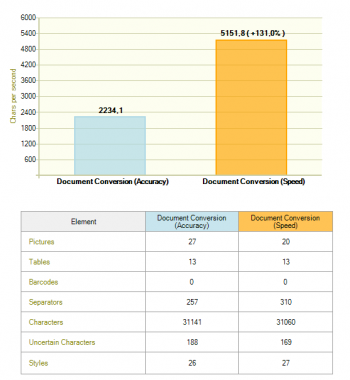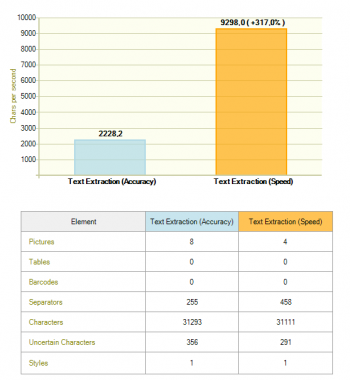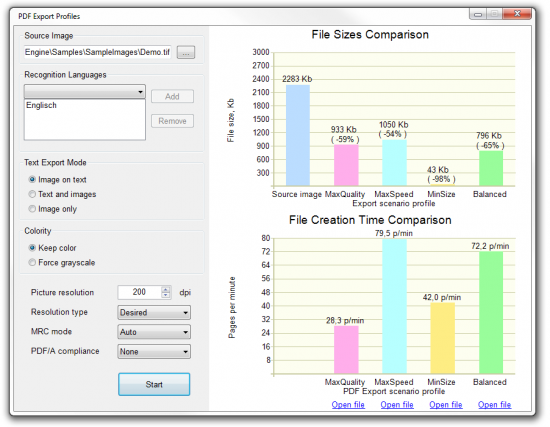Table of Contents
What's new in Version 11?
ABBYY FineReader Engine 11 CLI for Linux is a ready-to-use command line application that is based on ABBYY’s newest Optical Character Recognition (OCR) technologies. The new version is based on the Software Development Kit ABBYY FineReader Engine 11 and offers many new features and technology improvements.
-
Improved Core OCR Technologies

-
New image pre-processing and binarisation
-
New recognition language: Arabic
-
Increased OCR accuracy of Chinese, Japanese and Korean
-
Support for additional barcode types
-
-
Enhanced Processing
-
Native 64-Bit support
-
Processing profiles
-
Built-in support for multi-core processing
-
Faster recognition in the 'speed recognition mode'
-
-
Enhanced Export
-
New export formats: ODT, ePub, FB2, ALTO XML
-
Improved PDF export:
-
PDF/A-2 support (new)
-
PDF/A-3 support (new)
-
Enhanced compression - MRC compressed PDFs
-
PDF export profiles
-
-
Want to try?
The latest version of the ABBYY FineReader Engine 11 CLI for Linux is based on the newest ABBYY OCR technology and can be tested free of charge. 
Detailed description of improvements
Improved Core OCR technologies
-
Version 11 contains major technology improvements, especially in the area of image pre-processing and binarisation. The new algorithms deliver better image quality, so that the application delivers better recognition results. The feature produces much better results on images taken with digital camera.
-
The new version is the first ABBYY Linux application that supports Arabic OCR. The OCR for Arabic language can be combined with other recognition languages and is perfectly suited for international enterprises and govermental organisations.
-
New character classifiers for Asian languages deliver a recognition accuracy increase of up to 40% for Chinese, Japanese and Korean languages. This guarantees high recognition quality even for projects with mixed Asian and European languages.
-
It is now possible to detect and recognize 1D and the 2D barcodes: Aztec, DataMatrix, QRCode, MaxiCode (new)
Processing Improvements
-
64-Bit Support
The new version now is a native 64-Bit application and can directly be used on 64 bit operating systems without extending the system with 32-bit libraries.
-
Enhanced Fast Mode
The new Fast Mode is designed to optimise processing speed/accuracy balance for images of good quality. Up to 92% faster page throughput while maintaining the high level of recognition accuracy.
-
Built in Multi Core Support
OCR conversion is a very CPU intense process. The new CLI V11 can now distribute the pages of a multi-page document automatically on multiple CPU cores. With the newmultiProcessingMode option(-mpm) scalability is very easy to use. The number of CPU cores used can be adjusted automatically or be predefined.
-
Processing Profiles
FineReader Engine CLI 11 for Linux supports processing profiles for the most often used OCR processing scenarios. A profile is a set of tested and packaged settings of the OCR Engine and it can be controlled with the-lppprocessing option. Often there are 2 versions of the profiles: accuracy or speed. The screenshots below illustrate the impact on processing speed, but also the numbers of elements that are recognized (characters, tables pictures, etc.)
The following main profiles are available:-
Document Conversion,
-
Document Archiving
-
Text extraction
-
Barcode Recognition
-
others…
-
-
Infos & Parameters: General: Miscellaneous Keys


The illustration screenshot made with a Laptop (2012) Quad i7-3720QM, 2,6 GHz, Windows 7, 16 GB RAM, 64 bit; FineReader Engine 11 R1 - Std. sample files that are included in the pre-compiled sample that comes with the Windows SDK. more details... Note: The CLI tool offers the the functionality via parameters, but without a GUI; speed and recognition results of course vary on the document type, recognition language, image quality and used hardware.
Enhanced Export
-
New Export Formats
Version 11 of the CLI application adds new export formats:
-
PDF Export Enhancements
-
PDF/A-2u Support - creation of smaller PDF files using JPEG2000 compression
-
PDF/A-3 Support - PDF/A3 standard is supported, attachments can be kept during the PDF recognition
-
Improved MRC compression - internal technology improvement to increase the visual quality, but still create smaller files.
-
PDF Export Profiles The new export profiles for PDFs, make it easy to influence the creation of the exported PDFs. There are 4 different profiles for different use cases:
-
MaxSpeed
-
MaxQuality
-
MinSize
-
Balanced.
-
-
Documentation: parameter
-

Illustration screenshot made on a Laptop (2012) Quad i7-3720QM, 2,6 GHz, Windows 7, 16 GB RAM, 64 bit; FineReader Engine 11 R1 - Std. sample files that are included in the sample that comes with the Windows SDK. Note: The CLI tool offers the the functionality via parameters, but without a GUI; speed and recognition results of course vary on the document type, recognition language, image quality and used hardware.
Compatibility
-
FineReader Engine 11 CLI for Linux must be installed and activated with a serial number.
-
Licences from previous versions will not work.
-
Some options have changed their names (for example, -ptem instead of -pem to set the PDF export mode), so it is recommended to read the documentation.
-
The new version has to be called with “abbyyocr11” instead of “abbyyocr9”.
